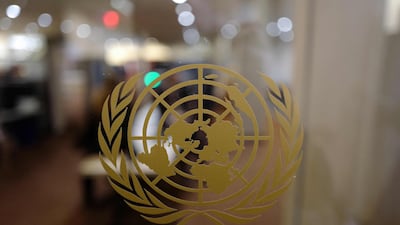In film, the United Nations has had its moments. Cary Grant, stepping out of a yellow cab outside the New York headquarters in North by Northwest, is probably the most iconic. The suave Roger Thornhill, an Alfred Hitchcock creation, managed to give a couple of hitmen the slip after a dramatic case of fake gunshots.
For the real life UN, the business of diplomacy is more humdrum. Paper, not celluloid, is the fabric on which speeches and resolutions have long been etched. But that is changing.
Email and websites triumphed long ago as the dominant means for the UN to deliver a message. Yet it came as a surprise when a few days ago the UN secretary general's spokesman told those of us who report from here that his office would no longer issue print press releases.
Within a few hours the metal racks where the papers have traditionally been placed every day had been taken away. There is a bit of a void.
A lot of paper will be saved, though not as much as you might think – 50 boxes a year from this small part of the UN.
The efficiency – about $2,000 – does not amount to much in a giant organisation whose total budget for 2018 and 2019 is $5.4 billion, but it is part of a modernisation that began in 2012.
If it were a shock for reporters it was an expected change for the staff who assist journalists. Jane Gaffney started working at the UN six days after arriving in New York from her native Ireland in 1982. She has done many jobs since, including electoral and peacekeeping missions overseas.
Now a senior information assistant in the office of the spokesperson for the secretary general, she is a woman who knows where to find things. She is also the office's records' keeper, likes the reliability of paper and is not quite ready to surrender.
“Online systems go down and just like in life, you need to have a back up,” she told me.
It did not take Jane long to prove her point. Asked which missive most stands out in her tenure, she cited then UN secretary general Kofi Annan's remarks to the General Assembly on September 23, 2003. Known as the “fork in the road” speech, the late Ghanaian diplomat's words were an impassioned plea to world leaders to stick with the multilateral order on which the UN was built.
His words came barely a month after the Canal Hotel bombing in Baghdad that had killed Sergio Vieira de Mello, the UN's special envoy, and 20 of his staff, widely considered the day Iraq's sectarianism began to spiral out of control.
Mr Annan's remarks reflected the sorrow he felt for those who died but spoke more broadly and openly of his personal regret that the UN had been unable to stop America and Britain's misguided push for war. Isolationism and divisions at the UN are today bigger than ever.
To Jane and her colleagues, the printed word stands for more than its electronic equivalent. Recovering the late Mr Annan's speech for my perusal, the online server where it was located was not functioning. But Jane had a file housing a paper copy and moments later I had a copy.
Some older journalists and members of diplomatic missions will continue to visit the spokesperson's office for printed speeches and summaries of meetings. They don't like computers. As long as Jane and her colleagues are around, they should be fine.

